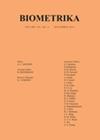On the optimality of score-driven models
IF 2.8
2区 数学
Q2 BIOLOGY
引用次数: 0
Abstract
Summary Score-driven models have been recently introduced as a general framework to specify time-varying parameters of conditional densities. %The underlying idea is to specify a time-varying parameter as an autoregressive process with innovation given by the score of the associated log-likelihood. The score enjoys stochastic properties that make these models easy to implement and convenient to apply in several contexts, ranging from biostatistics to finance. Score-driven parameter updates have been shown to be optimal in terms of locally reducing a local version of the Kullback–Leibler divergence between the true conditional density and the postulated density of the model. A key limitation of such an optimality property is that it holds only locally both in the parameter space and sample space, yielding to a definition of local Kullback–Leibler divergence that is in fact not a divergence measure. The current paper shows that score-driven updates satisfy stronger optimality properties that are based on a global definition of Kullback–Leibler divergence. In particular, it is shown that score-driven updates reduce the distance between the expected updated parameter and the pseudo-true parameter. Furthermore, depending on the conditional density and the scaling of the score, the optimality result can hold globally over the parameter space, which can be viewed as a generalization of the monotonicity property of the stochastic gradient descent scheme. Several examples illustrate how the results derived in the paper apply to specific models under different easy-to-check assumptions, and provide a formal method to select the link-function and the scaling of the score.分数驱动模型的最优性
摘要分数驱动模型最近被引入作为一个通用框架来指定条件密度的时变参数。基本思想是指定一个时变参数作为一个自回归过程,创新由相关的对数似然评分给出。分数具有随机特性,这使得这些模型易于实现,并且可以方便地应用于从生物统计学到金融等多种环境中。分数驱动的参数更新已被证明是最优的,因为它可以局部减少模型的真实条件密度和假设密度之间的Kullback-Leibler散度的局部版本。这种最优性的一个关键限制是,它只在局部参数空间和样本空间中成立,从而产生局部Kullback-Leibler散度的定义,实际上不是散度度量。当前的论文表明,分数驱动的更新满足基于Kullback-Leibler散度的全局定义的更强的最优性属性。特别是,分数驱动的更新减少了预期更新参数与伪真参数之间的距离。此外,根据条件密度和分数的缩放,最优性结果可以在参数空间上全局保持,这可以看作是随机梯度下降方案单调性的推广。几个例子说明了本文得出的结果如何应用于不同易于检查的假设下的特定模型,并提供了一种选择链接函数和评分标度的形式化方法。
本文章由计算机程序翻译,如有差异,请以英文原文为准。
求助全文
约1分钟内获得全文
求助全文
来源期刊

Biometrika
生物-生物学
CiteScore
5.50
自引率
3.70%
发文量
56
审稿时长
6-12 weeks
期刊介绍:
Biometrika is primarily a journal of statistics in which emphasis is placed on papers containing original theoretical contributions of direct or potential value in applications. From time to time, papers in bordering fields are also published.
 求助内容:
求助内容: 应助结果提醒方式:
应助结果提醒方式:


